|
|
|
Sort Order |
|
|
|
Items / Page
|
|
|
|
|
|
|
| Srl | Item |
| 1 |
ID:
129052
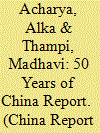

|
|
|
|
|
| Publication |
2014.
|
| Summary/Abstract |
With this issue, China Report commences its fiftieth year of publication. It seems a good time to look back over our long journey, to take stock, and also to look ahead at what our goals and priorities would be in the coming years. The China Report began its 'long march' in December 1964 as a bi-monthly, through the joint efforts of Giri Deshingkar and CRM Rao. Giri had just returned to India after completing a Bachelor of Arts in Chinese from the School of Oriental and African Studies, London, while CRM Rao, who had left a job in the corporate sector to commence work with the Radical Humanist, a journal started by the late M.N. Roy, was closely associated with a group of scholars in the Centre for the Study of Developing Societies, Delhi. It cost all of `1/- to buy a copy of China Report in those days, and for the princely sum of `5/- one could avail six copies annually
|
|
|
|
|
|
|
|
|
|
|
|
|
|
|
|
| 2 |
ID:
066746
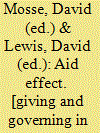

|
|
|
|
|
| Publication |
London, Pluto Press, 2005.
|
| Description |
vi, 223p.
|
| Series |
Anthropology, culture and society
|
| Standard Number |
0745323863
|
|
|
|
|
|
|
|
|
|
|
|
Copies: C:1/I:0,R:0,Q:0
Circulation
| Accession# | Call# | Current Location | Status | Policy | Location |
| 050388 | 306.3/MOS 050388 | Main | On Shelf | General | |
|
|
|
|
| 3 |
ID:
172042
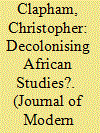

|
|
|
|
|
| Summary/Abstract |
Insistent calls to ‘decolonise’ African studies beg the question of what this quest actually involves. If it refers to an attempt to understand the continent's diverse and complex societies that builds on their indigenous structures and values, this was a task initiated during the decolonisation era of the 1950s and early 1960s. Led by historians and drawing heavily on insights from anthropology, it led to a revolution in the understanding of Africa, which nonetheless failed to maintain its impetus as a result of the political authoritarianism and economic decay of the post-independence period, which had a particularly damaging impact on Africa's universities. Of late, however, the phrase has come to refer to developments notably in North America and Europe, which in subordinating the study of Africa to agendas in the global North may appropriately be described not as decolonisation but as recolonisation. A genuine decolonisation of knowledge production for Africa must rest on a return to its roots within the continent itself.
|
|
|
|
|
|
|
|
|
|
|
|
|
|
|
|
| 4 |
ID:
112128


|
|
|
|
|
| Publication |
2012.
|
| Summary/Abstract |
This article discusses the ebb and flow of theoretical ideas in African Studies, specifically the interface between African Studies and Development Studies. It explores the epistemological nature of interdisciplinarity in African Studies, interrogating when and how theoretical insight may contribute to an understanding of material reality and welfare improvement in some circumstances, and miss the mark by a wide margin in other cases. The purpose of this exercise is to stimulate reflection on the contribution of African Studies to continental and global intellectual and material change, juxtaposing African Studies theory and its role as an applied field of study. This necessitates consideration of Africa's position in the interplay of world politics and the power of agenda-setting international institutions, notably the World Bank.
|
|
|
|
|
|
|
|
|
|
|
|
|
|
|
|
| 5 |
ID:
180658
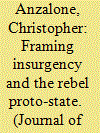

|
|
|
|
|
| Summary/Abstract |
This article traces the foundations, development, and evolution of Al-Shabaab’s multi-tiered media and information operations through a historical lens from proto and early Al-Shabaab media in 2006 and early 2007 up to the beginning of 2021. Arguing that the group’s media campaign is an integral part of its broader proto-state governance operations and kinetic actions, the article pays particular attention to central narrative frames aimed at domestic Somali, regional East African, and international audiences – both friendly and non-friendly – as well as to the role of media and information operations as part of the group’s domestic governance operations.
|
|
|
|
|
|
|
|
|
|
|
|
|
|
|
|
| 6 |
ID:
087026


|
|
|
|
|
| Publication |
2009.
|
| Summary/Abstract |
The repositioning of China as a ' world workshop' rests upon the nurturing of a new Chinese working class. This article focuses on questions of collective action of migrant workers who are now the major force of a new working class that actively strives to alter its fate through labour struggles. By studying the collective actions of migrant workers in the gemstone industry, we examine a process in which workers' resistance has developed from a single means to multiple means, from single-factory to cross-factory participation, from engaging only in legal action to launching varied collective action. Three primary questions are raised: first, what forms of collective labour action have arisen and what are their mechanisms of mobilisation? Second, how do shop-floor industrial relationships, legal systems and other institutional arrangements shape such collective resistance? Third, how do workers nurture class consciousness through their participation in collective action and, most importantly, how do they make sense of their struggle through a radicalisation process?
|
|
|
|
|
|
|
|
|
|
|
|
|
|
|
|
| 7 |
ID:
087039


|
|
|
|
|
| Publication |
New Delhi, Impex India, 1972.
|
| Description |
xii, 299p.
|
|
|
|
|
|
|
|
|
|
|
|
Copies: C:1/I:0,R:0,Q:0
Circulation
| Accession# | Call# | Current Location | Status | Policy | Location |
| 008707 | 338.96/SIN 008707 | Main | On Shelf | General | |
|
|
|
|
| 8 |
ID:
146001
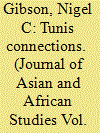

|
|
|
|
|
| Summary/Abstract |
Reflecting on Contested Terrains and Constructed Categories: Contemporary Africa in Focus, a book George Bond and I edited during our work at the Institute of African Studies at Columbia University in the late 1990s, this paper considers the notion of contested terrains, that for George Bond was played out in the scholarship of African studies, in the daily encounters which he had with his colleagues, and in his Zambian research. Bond understood these contestations as continuously operating on and across and often taking place below the surface or at the margins of insititutions. This paper emerged in response to Bond’s invitation to speak about Fanon’s psychiatry writings and Fanon’s critique of sociotherapy on a panel he was organizing at the American Anthropological Association in 2014 (AAA). After he died, the focus shifted to include Bond alongside Fanon and Foucault underscoring the continued need for dialog on the work of three intellectuals—African-American, African Caribbean, and French. The connections and misconnections between Fanon and Foucault is in part the discussion about contested terrains and the willfulness of constructed categories. Indeed, intellectual genealogies, the unknown connections as well as dividing lines was something that interested Bond, the anthrolopologist of the politics of knowledge.
|
|
|
|
|
|
|
|
|
|
|
|
|
|
|
|
|
|
|
|
|